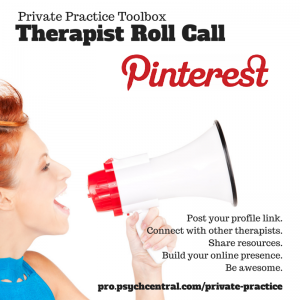 When you decided to go into the field of professional psychotherapy, it's likely that your reasons had little to do with money. Even as you first started, you probably didn't have dollars on the brain all the time (payments, insurance, fees, collections, etc.). Billing specialists deal with that stuff, not us, right? But those of us in private practice quickly discover how important it is to acknowledge and successfully navigate the financial aspect of our businesses. And resigning from managed care panels and switching to a fee-for-service model means that the responsibility to collect fees relies on the individual therapy practice; now, it's our job.
When you decided to go into the field of professional psychotherapy, it's likely that your reasons had little to do with money. Even as you first started, you probably didn't have dollars on the brain all the time (payments, insurance, fees, collections, etc.). Billing specialists deal with that stuff, not us, right? But those of us in private practice quickly discover how important it is to acknowledge and successfully navigate the financial aspect of our businesses. And resigning from managed care panels and switching to a fee-for-service model means that the responsibility to collect fees relies on the individual therapy practice; now, it's our job.
I certainly understand that it can be awkward. People get weird about money. I used to be uncomfortable asking clients for payment after they'd born their souls to me. But thankfully, there's a way to conquer money anxiety, serve your clients, and still meet the needs of your practice and of yourself. Here are some strategies I've discovered about how to be firm about finances and present your stated fees to clients with confidence:
(Re)Consider the Purpose of Money
Your own personal history may lead to your feeling anxiety about money. It may help to rethink the role it plays and the reason why we even have it in the first place: you are offering your time, energy, and skills to therapy, and in return, the client is offering you the resource of money. It's an energy exchange that can be emotionally neutral. It doesn't mean you are greedy or uncaring; not at all!
Value Yourself and Your Services
When I first started, I had a hard time seeing myself as a professional, which meant that I wasn't as confident or assertive about asking for money. But my supervisor helped me understand the training, skills, education, and experience I could offer. Remember what you're worth: you can provide valuable insight to those who are struggling, and you deserve to be compensated for your work. Keeping this in mind will help make it easier to accept payments and communicate about money issues.
Charge Before the Session
It works best to ask for payment at the beginning of the session before attempting to conquer tough emotional issues. This gets it out of the way right away and avoids the potentially awkward exchange at the end. There's no surprise, no uncomfortable conversation about fees owed. There's also something about being paid up front that is gratifying and enforcing for the therapist.
Use a "Money Script"
When possible, it's best to keep a separation between the therapist and the finances because it helps the client not associate his/her counselor with money. Use a planned and rehearsed script to communicate about payments. It may go something like this:
How would you like to pay for your session today?"
When potential clients ask, "Do you work with my insurance company?" I respond, "While we don't bill insurance directly, I'm happy to provide you with a receipt to submit for reimbursement from your insurance company. You may want to check with them and ask if you have out-of-network mental health benefits."
Have a Clearly Stated Payment Policy and Stick to It
Don't skimp on this. Take the time to develop and implement a carefully thought-out policy concerning payments, no-shows, cancellations, etc. By setting clear expectations, you can pave the way for an efficiently run practice with clients who attend sessions and take therapy seriously. Your actions and attitudes about finances will set the tone: if you feel anxious discussing money, your client likely will as well. But if you're professional, positive, and confident, a client will feel at ease.
My clinic policy is that if you are one session behind in payment your therapy is on hold until your account is up to date. Also, we charge full fee for no-shows and late cancellations, even on initial sessions, unless there is an emergency (read here for more about how to get paid for no-shows) . Therapist Leland Clipperton of Counseling & Mediation has a system in place where a client can actually receive a discount by pre-paying for 4 sessions in advance. Do some research, ask around, and get creative and innovative in developing a policy payment or tweaking your existing one.
You may find it helpful to have a system to notify your clients about their upcoming sessions. Making phone calls or using your EHR to send automated text messages or emails a day or two beforehand can serve as important reminders and reinforce the value of therapy. So if they're making the financial investment, we might consider making an extra effort to encourage them to be there.
In my 12 years in private practice, I've gotten extremely comfortable talking about financial issues with clients. With time, experience, and the use of these strategies, I am confident that the same can be true of you.
How are YOU firm about finances?
What money tips and strategies that have benefitted your practice can you share?
Click here to access my webinar "How to Break Up With Managed Care" and learn more about how to improve your therapy practice.
Get practice tips and blog updates in your inbox. Sign up for the Private Practice Toolbox Newsletter here.
Join my Private Practice Toolbox Facebook group and connect with 2800 therapists around the globe in 2 simple steps: 1) Click request to join the group and 2) Fill out this brief questionnaire before you'll be added to the group.









As healers, we genuinely like to do our work. Guiding clients through the therapy process and seeing them make progress is why we do what we do. But if you're in private practice, you know there's a lot going on in the back end and that it's crucial to run an efficient and organized business.